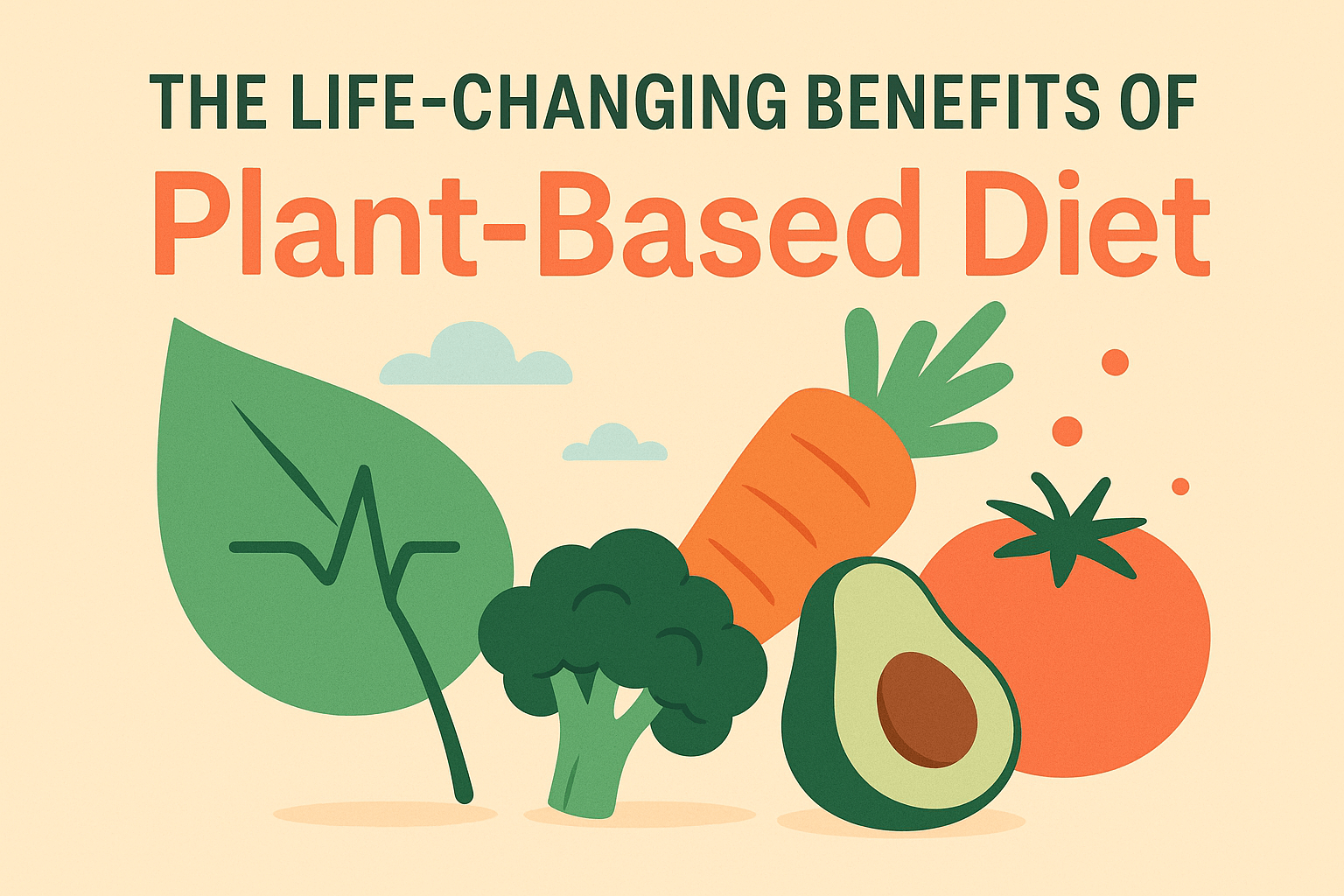Switching to a plant-based diet can unlock a world of health benefits, nourishing your body with nutrient-rich foods that support vitality and well-being.
Health Benefits: More Than Weight Loss
Heart Health Hero
A plant-based diet shines brightest in cardiovascular protection. Studies show it:
- Reduces heart disease risk by 52% compared to meat-heavy diets
- Lowers LDL cholesterol through soluble fiber from oats and beans
- Manages hypertension via potassium-rich foods like spinach and bananas
Real-World Example:
The National Institutes of Health reports plant-based eaters have 32% fewer heart attacks.
Environmental Wins: Your Fork’s Footprint
Climate Crisis Combat
Choosing plants over animal products:
- Cuts carbon footprint by 1.5 tons annually (equivalent to not driving 3,700 miles)
- Saves 1,800 gallons of water per day – enough for 50 showers
- Preserves biodiversity by reducing deforestation for livestock
Shocking Stat:
Producing one beef burger uses land that could grow 83 potato plants.
Nutrient Powerhouse Perks
Gut Health Revolution
Plant-based diets transform digestion through:
- Microbiome diversity boosts from 40+ weekly plant varieties
- Fiber optimization (42g/day vs. 15g in standard diets)
- Natural anti-inflammatory effects from turmeric and berries
Pro Tip:
Rotate 3 different colored vegetables daily for maximum phytonutrient density.
Brain Power & Energy: The Mental Edge
Sharper Mind, Brighter Mood
Plant-based diets fuel cognitive health through:
- Mental clarity improvements from omega-3s in chia seeds and walnuts
- Energy stabilization via slow-digesting complex carbs (quinoa, oats)
- Skin health enhancements from vitamin E-rich almonds and sunflower seeds
Science Spotlight:
A 2019 Nutrients study found plant-based eaters scored 18% higher on cognitive tests than meat-eaters
Budget-Friendly Protein Solutions
Affordable Muscle Fuel
Contrary to myths, plant proteins cost 63% less per gram than animal proteins:
- Lentils: $0.30/serving (18g protein)
- Tofu: $1.50/block (20g protein)
- Black Beans: $0.25/cup (15g protein)
Pro Tip:
Batch-cook 3 lbs of chickpeas weekly ($2 total) for salads, hummus, and roasted snacks.
Plant-Based vs. Popular Diets
Keto Comparison
| Factor | Plant-Based | Keto |
|---|---|---|
| Sustainability | Low carbon footprint | High dairy emissions |
| Nutrient Density | 27+ vitamins/minerals | Limited micronutrients |
| Longevity | Linked to extended lifespan | Mixed research outcomes |
Paleo Perspective
While Paleo avoids processed foods, it misses:
- Fiber optimization from whole grains
- Antioxidant diversity in legumes
- Cost-effectiveness of plant proteins
The Ethical Plate: Compassion Meets Nutrition
Animal Welfare & Personal Alignment
Choosing plant-based meals directly impacts:
- Cruelty-free nutrition: Saves ~200 animals annually per person
- Eco-friendly diet choices: Reduces agricultural runoff harming marine life
- Sustainable eating benefits: Preserves habitats for endangered species
Real-World Impact:
If everyone adopted Meatless Mondays, 1.4 billion animals would be spared yearly – equivalent to emptying 460 factory farms.
Longevity Science: Eat Yourself Younger
Telomeres & Cellular Renewal
Plant-based diets combat aging through:
- Telomere length preservation (DNA protection) via folate-rich leafy greens
- Oxidative stress reduction from berries and dark chocolate
- Chronic inflammation markers lowered by 37% in turmeric users
Top Age-Defying Foods:
- Walnuts: Omega-3s for brain longevity
- Kimchi: Probiotics for gut-driven immunity
- Sweet Potatoes: Beta-carotene for skin elasticity
7-Day Meal Plan ($75 Budget)
Day 1
- Breakfast: Oats with chia, banana, and almond butter (healthy fats from plants)
- Lunch: Lentil soup with spinach (iron-rich plant foods)
- Dinner: Tofu stir-fry with brown rice (plant-based protein sources)
Day 2
- Breakfast: Smoothie with kale, mango, and flaxseed (antioxidants in plant foods)
- Lunch: Quinoa salad with chickpeas and avocado (nutrient-rich plant foods)
- Dinner: Stuffed bell peppers with black beans (high-fiber diet benefits)
Day 3
- Breakfast: Whole grain toast with avocado and nutritional yeast (B12 alternatives)
- Lunch: Chickpea curry with basmati rice (anti-inflammatory foods)
- Dinner: Zucchini noodles with marinara and walnuts (plant-based protein sources)
Day 4
- Breakfast: Smoothie with kale, mango, and flaxseed (antioxidants in plant foods)
- Lunch: Quinoa salad with chickpeas and avocado (nutrient-rich plant foods)
- Dinner: Stuffed bell peppers with black beans (high-fiber diet benefits)
Day 5
- Breakfast:
Almond butter toast on whole grain bread + orange slices
(Vitamin E-rich snacks + immune-boosting vitamin C) - Lunch:
Leftover lentil shepherd’s pie with steamed broccoli
(Eco-friendly tip: Repurpose leftovers to reduce food waste) - Dinner:
Chickpea tacos with avocado, salsa, and cabbage slaw
(Ethical food choice: Use fair-trade corn tortillas)
Day 6
- Breakfast:
Chia pudding with oat milk and mixed berries
(*Omega-3s for brain health* + antioxidants) - Lunch:
Quinoa-stuffed tomatoes with pine nuts
(Sustainable eating: Use locally grown tomatoes) - Dinner:
Sweet potato curry with coconut milk and spinach
(Anti-inflammatory foods: Turmeric, ginger)
Day 7
- Breakfast:
Smoothie bowl with kiwi, banana, and pumpkin seeds
(Vitamin E + plant-based protein sources) - Lunch:
Mediterranean hummus plate with olives and cucumber
(Healthy fats from plants + gut health optimization) - Dinner:
Mushroom lentil loaf with mashed cauliflower
(Cruelty-free nutrition alternative to meatloaf)
Weekly Total Breakdown
| Category | Details |
|---|---|
| Plants Used | 42+ varieties (for microbiome diversity) |
| Fiber | 100% RDA met (25-38g/day) |
| Budget | 75total(10.71/day for family of 4) – See shopping list below |
Complete Shopping List ($75 Total)
Proteins & Legumes ($18)
- Lentils (2 lbs dry) – $3
- Chickpeas (2 cans) – $2
- Black beans (2 cans) – $2
- Tofu (1 block) – $2.50
- Hummus (8oz) – $3
- Almond butter (12oz) – $5.50
Grains & Starches ($12)
- Rolled oats (18oz) – $2.50
- Brown rice (2 lbs) – $3
- Quinoa (1 lb) – $4
- Whole grain bread – $2.50
Vegetables ($22)
- Spinach (2 bunches) – $4
- Bell peppers (6) – $3
- Sweet potatoes (4) – $2.50
- Zucchini (3) – $2
- Mushrooms (8oz) – $2
- Cauliflower (1 head) – $3
- Tomatoes (6) – $3
- Broccoli (1 head) – $2.50
Fruits ($15)
- Bananas (8) – $2
- Mango (2) – $3
- Blueberries (12oz frozen) – $3
- Avocados (4) – $4
- Kiwis (4) – $3
Miscellaneous ($8)
- Nutritional yeast – $4
- Flaxseed – $2
- Turmeric powder – $2
Budget Hacks
- Buy Dry Legumes: Save 60% vs. canned (soak overnight)
- Seasonal Produce: Swap berries for apples if out of season
- Bulk Bins: Get oats, rice, and spices cheaper
- Reusable Containers: Store leftovers eco-friendly
Final FAQs
Q: “Can I get enough iron without meat?”
A: Yes! Pair iron-rich lentils with vitamin C foods (bell peppers) for 200% better absorption.
Q: “Do I need to buy organic?”
A: Prioritize organic for the “Dirty Dozen” (strawberries, spinach) but skip for affordable plant-based foods like bananas and broccoli.
Conclusion: Your Plate, Your Power
Adopting a plant-based diet offers:
- Body: 52% lower diabetes risk, weight loss maintenance
- Planet: 73% smaller carbon footprint, water conservation
- Ethics: Cruelty-free nutrition aligning with global justice
“Start your journey today with our free *30-Day Plant-Based Challenge Kit* → [Includes meal plans, recipes & progress tracker]”

